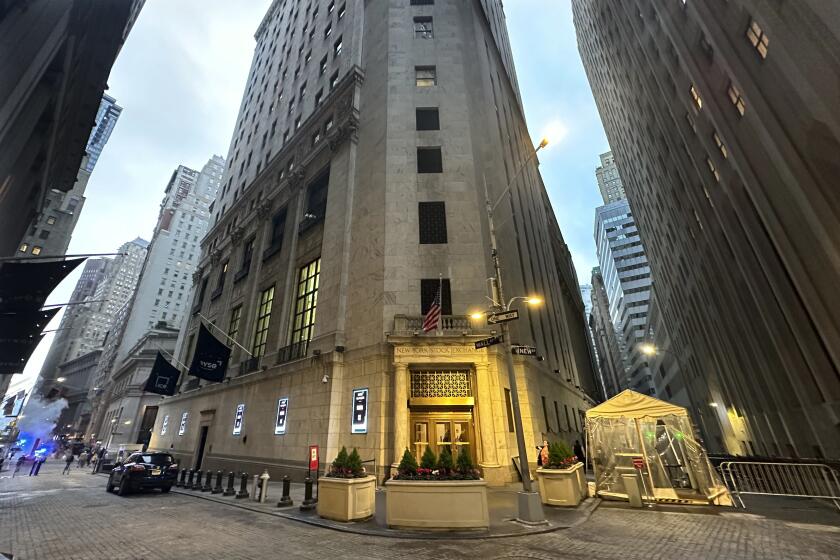Nasdaq Knocked Down to Oct.’s Level
The “buy on the dip” strategy has failed again for many Nasdaq market investors.
The Nasdaq composite index Wednesday slid through its previous 2002 low, slumping 16.95 points, or 1%, to 1,713.34--its lowest level since Halloween.
The index’s previous 2002 closing low of 1,716 was set Feb. 21.
The technology-heavy index’s new low for the year is a reminder that although many stock sectors have stayed strong, the bear market in major tech and telecom names may not have run its course. Investors who bought into the sector last fall or after its sell-off in February may have only losses to show for their courage.
“The realization that has set in is that the market recovered too quickly after Sept. 11, especially the tech and telecom sectors,” said Jeff Van Harte, manager of the Transamerica Premier Equity mutual fund in San Francisco, noting that the Nasdaq index rocketed 45% from Sept. 21 through Jan. 4.
“The fundamentals of a lot of these companies have fallen off a cliff in the last three to six months,” Van Harte said. That has been reflected in the poor first-quarter earnings many tech firms have reported.
The Nasdaq index remains well above its three-year low of 1,423 reached Sept. 21 in the aftermath of the Sept. 11 terrorist attacks.
But investors who bought into the fourth-quarter rally have been hammered--a familiar pattern since the tech bubble burst in spring 2000, and periodic rallies have quickly given way to renewed selling.
For those with a shorter-term outlook, at least, this year’s sell-off has been another blow to the buy-the-dips mentality that kept the bull market advancing through the late 1990s.
Shares of Microsoft fell 97 cents to $53.02 on Wednesday, bringing the stock’s year-to-date decline to 20%. It had rallied from $49.71 on Sept. 21 to a peak of nearly $70 on Jan. 17 before sliding anew.
Chip maker Broadcom slid $1.45 to $34.01 Wednesday. The stock had surged from $18.77 on Oct. 1 to $51.43 by Jan. 9. It’s down 17% this year.
The broader market held up better Wednesday, as it has for most of this year. The Dow industrial average eased 58.81 points, or 0.6%, to 10,030.43, and the Standard & Poor’s 500 was off 0.7% to 1,093.14.
Falling stocks outnumbered winners by a fairly narrow margin of 17 to 15 on the New York Stock Exchange, and by 19 to 16 on Nasdaq. Trading was active.
Year-to-date, Nasdaq has slumped 12.2%, while the S&P; 500 is off 4.8% and the Dow is up 0.1%.
Bill Ryder, market strategist at First Union Securities in Richmond, Va., said the Value Line composite, an “equally weighted” index of 1,700 stocks, remains near its all-time high reached April 16, and that S&P;’s small- and mid-cap stock indexes are up 9% and 5.7% year-to-date.
“The broad market really is not as bad as the capitalization-weighted indexes like the Nasdaq and the S&P; 500 would have you believe,” Ryder said. “Aside from large-cap growth, things have held up” as many investors have hunted for stocks that will benefit from an economic recovery.
Ryder noted that Nasdaq’s decline this year has “retraced” slightly more than half of its fourth-quarter rally.
From a chart-watcher’s viewpoint, he said, that is “entirely normal and should be expected after such a big move, even if it feels awful.”
He warned, however, that a descent through the 1,630-1,640 level--which would represent a giveback of two-thirds of the Sept. 21-Jan. 4 rally--might raise the specter of the index falling to a new multiyear low, further rattling investors.
In other trading Wednesday, Treasury bond yields eased as mixed economic data led traders to speculate that the Federal Reserve may wait until the second half of the year to raise interest rates. The yield on the benchmark 10-year Treasury note fell to 5.11% from 5.16% on Tuesday.
Among Wednesday’s highlights:
* Software stocks led Nasdaq lower. Oracle dropped 62 cents to $10.50, and Siebel Systems slumped $1.42 to $23.76.
Other tech losers included IBM, down 83 cents to $86.50; Texas Instruments, off 68 cents to $31.75; and KLA-Tencor, down $2.90 to $60.31.
* Some battered telecom stocks rebounded. AT&T; Wireless added 2 cents to $8.96; WorldCom Group gained 7 cents to $3.48.
* Internet security specialist VeriSign plunged $3.58 to $18 after SoundView Technology downgraded the stock, citing increased risk in its domain-name business.
* Online retailer Amazon.com was a bright spot in tech, zooming $2.73 to $16.50 after posting a narrower-than-expected first-quarter loss and raising its 2002 guidance. The stock is up 55% year-to-date.
* InVision Technologies dived $6.91 to $27.44 even though the maker of airport security scanners beat Wall Street earnings expectations. The U.S. Transportation secretary said his agency will need fewer machines than some had expected.
* Amgen rose $1.36 to $56.11 after J.P. Morgan Securities upgraded the biotech giant, forecasting strong revenue growth. Among other drug and biotech companies, Biogen gained $1.36 to $42.90 and Forest Labs soared $4.35 to $78.40 after both beat profit forecasts.
* Power plant operator Calpine slipped $1.53 to $11.80 after reporting a first-quarter loss and saying it will sell additional shares.
* In the financial sector, Merrill Lynch sagged $2.49 to $44.65 as California and New Jersey joined the widening probe over analysts’ research. Morgan Stanley Dean Witter lost $2.51 to $50.99, and Lehman Bros. fell $2.37 to $60.15.
Market Roundup, C6-7






